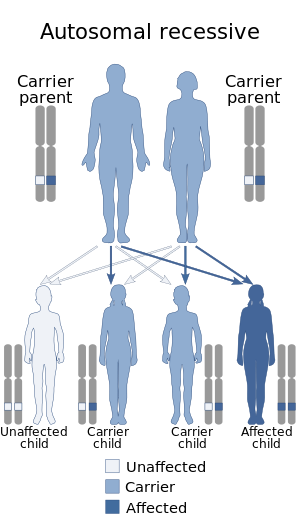Spondyloepimetaphyseal dysplasia, Pakistani type
| Spondyloepimetaphyseal dysplasia, Pakistani type | |
|---|---|
| Other names | Spondyloepimetaphyseal dysplasia, PAPSS2 type[1] |
 | |
| Spondyloepimetaphyseal dysplasia, Pakistani type is inherited in an autosomal recessive manner | |
| Specialty | Medical genetics |
Spondyloepimetaphyseal dysplasia, Pakistani type is a form of spondyloepimetaphyseal dysplasia involving PAPSS2 (also known as "ATPSK2").[2] The condition is rare.
Signs and symptoms[]
This condition is a skeletal dysplasia characterized by short stature, mild brachydactyly, kyphoscoliosis, abnormal gait, enlarged knee joints, precocious osteoarthropathy, platyspondyly, delayed epiphyseal ossification, mild metaphyseal abnormalities, short stature and short and bowed legs. Intelligence is normal.
Some patients may manifest premature pubarche and hyperandrogenism.
Other features that may form part of the syndrome include precocious costal calcification, small iliac bones, short femoral necks, coxa vara, short halluces and fused vertebral bodies.
Genetics[]
This condition is inherited in an autosomal recessive fashion. It is due to mutations in the Bifunctional 3'-phosphoadenosine 5'-phosphosulfate synthetase 2 (PAPSS2) gene which is located on the long arm of chromosome 10 (10q23.2-q23.31).[3]
Diagnosis[]
Radiology[]
Radiographic features include delayed epiphyseal ossification at the hips and knees, platyspondyly with irregular end plates and narrowed joint spaces, diffuse early osteoarthritic changes (in the spine and hands), mild brachydactyly and mild metaphyseal abnormalities which predominantly involve the hips and knees.
Treatment[]
This section is empty. You can help by . (November 2017) |
History[]
This condition was first described in a large eight generation consanguineous Pakistani family.
The causative mutation was identified in 1998.[4]
References[]
- ^ RESERVED, INSERM US14-- ALL RIGHTS. "Orphanet: Spondyloepimetaphyseal dysplasia, PAPSS2 type". www.orpha.net. Retrieved 8 April 2019.
- ^ Faiyaz ul Haque M, King LM, Krakow D, et al. (October 1998). "Mutations in orthologous genes in human spondyloepimetaphyseal dysplasia and the brachymorphic mouse". Nat. Genet. 20 (2): 157–62. doi:10.1038/2458. PMID 9771708.
- ^ "Symbol report for PAPSS2". HUGO Gene Nomenclature Committee.
- ^ Ahmad M, Haque MF, Ahmad W, et al. (August 1998). "Distinct, autosomal recessive form of spondyloepimetaphyseal dysplasia segregating in an inbred Pakistani kindred". Am. J. Med. Genet. 78 (5): 468–73. doi:10.1002/(SICI)1096-8628(19980806)78:5<468::AID-AJMG13>3.0.CO;2-D. PMID 9714015.
External links[]
- Proteoglycan metabolism disorders